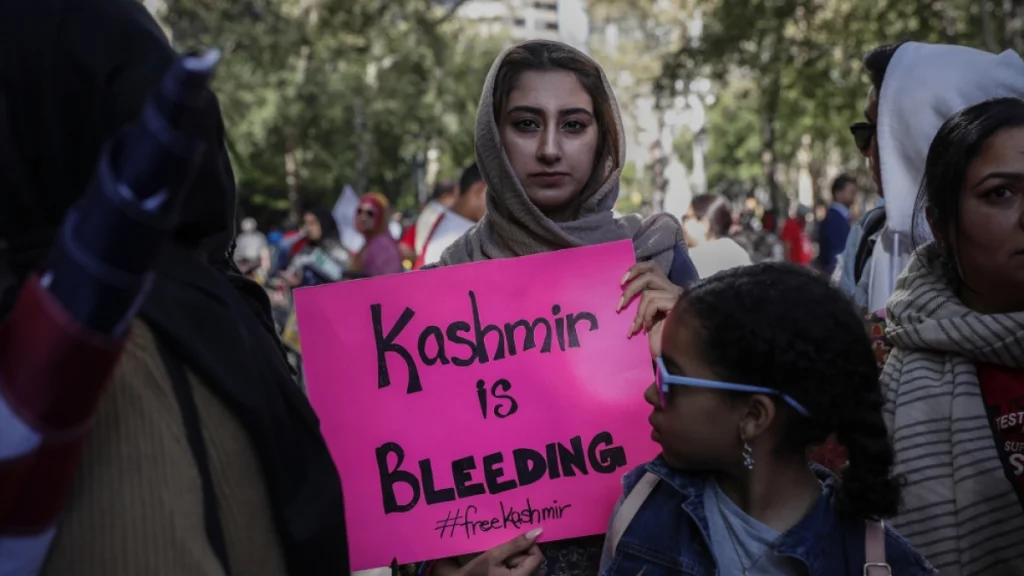Sainik Colonies: india Intensifies Its Settler Colonial Project in Kashmir
January 24, 2024
Poonch, Indian-occupied Kashmir.
From European colonization of the Americas, Australia, and New Zealand to the Israeli settler-colonization of Palestine, dispossessing indigenous communities from their land, and taking it over, is an integral part of colonization and occupation. In a similar manner, the indian state’s settler colonial project in Kashmir has been rapidly advancing since 2019. This has meant a rapid expansion of infrastructure that supports Indian settlers and heightened propaganda in public discourse. The latest in these moves is the setting up of “Sainik Colonies” or Defence colonies for the families of slain indian soldiers in Kashmir. The indian regime’s Lieutenant Governor recently announced the plans of his administration to set up these colonies as he also called on retired Indian occupational soldiers to come and help in the fight against ‘terrorism’.

Credit: Al Jazeera
Here is why this is important:
Land allocation is a hallmark of settler colonialism, dispossessing indigenous populations and altering demographics in favour of the settler state. The indian government has made it clear that these sainik colonies will be set up to amplify the fight against ‘terrorism’ which, like other anti-colonial resistance, has been long used to describe Kashmir’s freedom movement.
The indian state beyond figurative denial, has all but publicly admitted its aspirations to affect a demographic change in Kashmir. The Muslim majority region and its fight for freedom has been a long standing thorn in the shoes of the so-called largest democracy in the world. This has meant unbridled powers to the indian forces to commit extra-judicial killings, facilitation of settling of indians in Kashmir, allotment of Kashmir domicile to indians, especially members of indian occupational forces, and psychological warfare to drive Kashmiris out of Kashmir or make them subservient to the settler project.
Beyond demographic shifts, the militarized nature of these colonies further fuels concerns. Kashmir is the world’s most heavily militarized zone and placing retired soldiers in segregated colonies will be used to normalize militarism. Such an environment will be easy for the indian state to morph into one of much more surveillance infrastructure and control. The presence of settlements will create further military infrastructure. Accusations of human rights abuses against the indian occupational forces in Kashmir are widespread and come to fore on a daily basis; setting up of these colonies is bound to multiply these on a much larger scale. In essence, those who have disappeared, raped, and killed Kashmiris and their families will now be living in their midst.
The process to disposs Kashmiris of their own land accelerated during the pandemic, with demolitions carried out across the region, leading to homelessness of indigenous population. While at some places it was ruthlessly carried out in the name of reclaiming encroached state land, at other places rebels, their families and sympathizers were subjected to home demolitions. Properties of Kashmiris continue to be ceased and attached across the valley, while plans to allot land to indian soldiers are being finalised.
India’s settler colonialism project in Kashmir is in overdrive. The occupational state is employing new strategies aimed at affecting demographic changes in the region every day. The Sainik Colony project enables india to perpetuate more militarism alongside it normalization, which will result in more crippling surveillance of everyday life in the region. As india advances, it is more important for us to talk about this in popular discourse and public spaces.
Share this to spread the word and expose the india state’s plans in Kashmir. To stay connected to day-to-day happenings of Kashmir, support StandWithKashmir across social media.
Stay in touch with Stand with Kashmir.
Stand With Kashmir (SWK) is a Kashmiri-driven independent, transnational, grassroots movement committed to standing in solidarity with the people of indian-occupied Kashmir in ending the indian occupation of their homeland and supporting the right to self-determination of the pre-partition state of Jammu and Kashmir. We want to hear from you. If you have general inquiries, suggestions, or concerns, please email us at info@standwithkashmir.org.
[/vc_column_text][/vc_column][/vc_row]
©2025 StandWithKashmir All rights reserved. SWK is a 501(c)(3) non-for-profit organization.


Leave a Reply